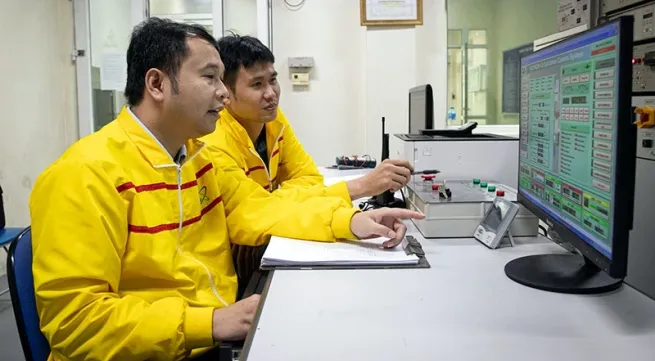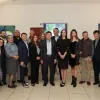Nuclear energy projects need to focus on human resource training

Given that reality, it is necessary to seriously consider the human resource problem and build a systematic training programme to train new and retrain human resources at many different levels, gradually creating a team of leading experts for applied research, operation, and management of nuclear facilities.
Promoting key projects
According to scientists, in the context of combating climate change and achieving CO2 balance according to commitments at COP26 and COP28, the research and application of nuclear energy is becoming increasingly important. Nuclear energy applications have been present in important areas such as healthcare, agriculture, industry, and environmental resources.
With its large capacity and stable and reliable power sources, without CO2 emissions, nuclear power is a growing trend among many countries in the green transition process.
In that context, the Vietnamese nuclear energy industry is promoting a number of key projects, such as the Nuclear Science and Technology Research Centre project — which is part of an agreement between Vietnam and Russia signed in November 2011 — and the National network of environmental radiation monitoring and warning.
In addition to renewable energy sources, the nuclear power can help balance energy supply, ensuring a stable and reliable power source for the economy and society in the long term.
Developing nuclear power will create a high-quality workforce to develop the country; an opportunity to strongly promote science and technology; and promote fundamental industries to develop the country.
Preparing human resources
Dr. Tran Chi Thanh, Director of the Vietnam Atomic Energy Institute, said that since the 1950s and 1960s, the Party and State have sent cadres and students to other countries to study and research in the nuclear field.
In the past 20 years, Vietnam has sent more than 400 students to Russia to study nuclear power, especially since the National Assembly approved investment in the Ninh Thuan Nuclear Power Project in 2009.
In addition, Vietnam Electricity (EVN) and Japan have trained a total of more than 20 cadres for the nuclear power project.
However, after the policy of stopping nuclear power projects was announced, most of these trained cadres switched to working in other fields, while a small number of cadres returned to work at the Vietnam Atomic Energy Institute.
There are about four to five Vietnamese cadres who, after graduating from the National Research Nuclear University MEPhI (Russia), were recruited by the Russian State Atomic Energy Corporation (ROSATOM) to work at the nuclear power project in Bangladesh.
Over the past 10 years, the Vietnam Atomic Energy Institute has also sent nearly 100 cadres to Russia and some other countries, such as Japan and the Republic of Korea, to do master's or doctoral studies. After completing their doctorates, some cadres continue to stay abroad to study.
Thus, up to now, the number of cadres in the nuclear field who continue to follow their majors (in research institutes and universities in the country) is about 1,000 people, with the number of cadres who have retired in recent years being quite large.
Looking at the above figures, it can be seen that the force participating in research, implementation, application as well as the state management on atomic energy are very small. It is difficult to meet the current reality and tasks.
In case Vietnam returns to nuclear power projects, the number of human resources needed will be much higher. Therefore, Vietnam needs to develop a plan to train nuclear human resources to be able to promptly meet important tasks in the new period, Dr. Tran Chi Thanh emphasised.
According to experts, in order to build a human resource training program for the nuclear industry, it is necessary to first clearly define the immediate goals and determine the human resource needs.
To serve the Nuclear Science and Technology Research Centre project, at the end of September, within the framework of the visit to Russia, a delegation of the Ministry of Science and Technology led by Minister Huynh Thanh Dat visited and worked with the Joint Institute for Nuclear Research (JINR) and the ROSATOM, as well as leading nuclear universities such as MEPhI, Bauman, or Moscow Power Engineering Institute (MPEI).
The key issues discussed at the meetings were promoting cooperation in training, developing human resources, research groups, and experts for each field of the Vietnamese atomic energy industry.
The Vietnam Atomic Energy Institute is actively promoting research cooperation and sending staff to work at the JINR to train key staff for the project starting in 2025. At the same time, the institute is working with the JINR to develop a plan for training young human resources for the period 2025-2030 and onwards.
To successfully implement the human resource training programme, experts said that it is necessary to have more attention from the Party and State. It is necessary to focus on communication, encourage talented students to study nuclear science, and have appropriate funding to organise and implement training programme plans.
Tags:





